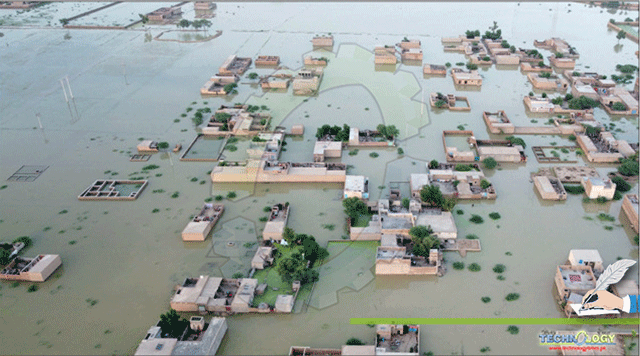Extreme flooding has taken a toll on Pakistan’s ability to feed its people, with vast tracts of farmland submerged, crops and food stores destroyed, and houses and livelihoods destroyed.

By Muhammad Uzair Aslam, Jahangir Ahmed, Saeed Ahmed and Muhammad Alamgeer
Fears of severe food shortages and the continued spread of waterborne lethal diseases have been raised in Pakistan, a country of roughly 220 million people, as a result of weeks of devastating flooding brought on by climate change-driven irregular monsoon rains. According to the U.N., this has led to widespread flooding and landslides, which have had detrimental effects on infrastructure, property, and human life. The Office for the Coordination of Humanitarian Affairs reported that “the livestock sector has also experienced severe losses, with over 733,000 livestock reportedly killed. Initial estimates on the ground suggest that at least 3.6 million acres of crops/orchards across the country have already been affected.” More than 1,200 people have died, including 416 children, and at least 6,000 more have been hurt since mid-June, when the monsoon rains started. According to Pakistani officials, more than 1.1 million homes have been destroyed or damaged, and 33 million people in the 80 hardest-hit areas will need aid in some capacity. Nearly 500,000 people are housed in relief camps, while many more have been displaced and are staying with other families. The administration issued a warning that a catastrophe in food security is imminent.
Crops of rice and cotton as well as vegetables like onions and tomatoes have been harmed by rain and devastating floods. They also pose a threat to the upcoming wheat planting season at a time when the world cannot afford another disruption in the supply of grains. Following Russia’s invasion of Ukraine, prices for household essentials increased dramatically worldwide, setting a record for food inflation. The devastating flood is another blow to Pakistan, which is already dealing with an economic crisis and is expected to cost the country $10 billion. The destruction of food supply may raise Pakistan’s need for imports and put more strain on the world’s agricultural markets. “The agricultural industry is in disarray. According to Ahmad Jawad, vice president of Pakistan Businesses Forum and a farmer of wheat, maize, citrus fruits, and sugarcane, “the cotton crop and vegetables are completely wiped off in many important locations. “Weird weather just won’t let us off the hook. Heat wave first, then floods. The United Nations lists Pakistan as one of the country’s most susceptible to climate change. Recently, Pakistan experienced its heaviest rainfall in at least three decades. The administration estimates that around a third of the nation is currently under water, and more than 1,100 people have died as a result. According to early estimates cited by Pakistan’s planning minister Ahsan Iqbal on Tuesday, the torrential rains may have ruined up to half of the country’s cotton crop. Pakistan produces 5% of the world’s cotton, making it the fifth-largest producer in the world. The harm could cause the world’s cotton supply to further decline. The ongoing monsoon spells have devastated enormous amounts of ready-to-reap crops across the South Asian nation, leading to shortages of staples, vegetables, and fruits in markets and, as a result, skyrocketing prices for essential commodities. The hardest hit provinces have been the southwestern Balochistan, southern Sindh, and northwestern Khyber Pakhtunkhwa provinces, where torrential rains have destroyed large swathes of o The southern regions of the northeastern Punjab province, which accounts for 67% of the nation’s overall agricultural output, have also sustained significant damage from recent rains and flooding It will be difficult to sow the wheat crop for the following year, which begins in October. Shehbaz Sharif, the prime minister, stated in parliament last month that Pakistan and Russia are already in discussions over the import of wheat. The nation had a roughly 2.6 million ton shortfall of wheat even before the floods.
As part of its ongoing efforts to provide help to Pakistan’s flood victims, the World Food Program (WFP) has launched a flash appeal. In the wake of a “climate-change driven tragedy,” Julien Harneis, the UN Resident Coordinator and Humanitarian Coordinator in Pakistan, called for “burden-sharing and solidarity.” He called the floods Pakistan’s “greatest challenge” in decades. In light of this, the UN has launched a $161 million flash appeal for Pakistan that will “provide critical food and cash assistance to nearly one million people in districts in Balochistan, Sindh, Punjab, and Khyber Pakhtunkhwa Provinces,” with the assertion that an additional $34 million is urgently required to scale up disaster relief efforts.

Authors: Muhammad Uzair Aslam, Jahangir Ahmed, Saeed Ahmed and Muhammad Alamgeer.